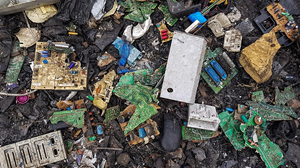By Erin M.
In 2016, a United Nations-backed study found that a staggering 45 million tons of electronics waste was accumulated in that year alone! Electronics waste or e-waste includes batteries, power supplies, precious metals, plastics, and other components found in electronics. E-waste pollutes water systems and soil and many electronic components are highly toxic. As demand for newer and newer models of computers, tablets, smartphones, and other electronic devices increases, our landfills fill up with unused and wasted materials that could be recycled and reused instead. Electronic “Right to Repair” bills have been introduced in recent years to help curb electronics waste and to give consumers more power to reuse and recycle.
You may have heard about Right to Repair bills being introduced in the last few years. These Right to Repair bills have been drafted in an effort give consumers more power over their own electronic devices. Companies like Apple only allow customers to have their devices serviced through authorized vendors. A national Right to Repair law would allow for customers to not only go to any vendor they’d like to get their devices serviced, but it would also allow for customers to fix their own devices and compel manufacturers to provide the necessary information to do so.
The Right to Repair movement started in 2012 with the automotive industry in Massachusetts and the Motor Vehicle Owners’ Repair Act. The bill required manufacturers to provide necessary documentation to allow anyone to repair their own vehicle. The bill was never passed on a federal level, but major automobile trade organizations signed a memorandum promising to abide by the Right to Repair standards in all 50 states.

Currently, there are several Right to Repair bills being formulated in the United States and the European Union pertaining to digital electronics. Twenty states in the US have active Right to Repair legislation in the works, including our very own Washington State. None of these bills have been passed yet, but we are closer than ever before. As of February 2020, Massachusetts is leading the charge again on Right to Repair with the Digital Right to Repair Act moving out of committee in both the State House and Senate. It’s a major hurdle to pass for the movement, and it is the first bill of its kind to get past committee. The next step would be for the Massachusetts State House or Senate to bring it to the floor for a vote.
If these bills pass, they promise major change not only to big tech companies but also potentially to the design of future technology. How might a company design a computer if customers were expected to repair it themselves? How might Apple design new iPhone models if most consumers replaced the lithium-ion batteries on their own? Would people keep their smartphones for longer periods of time if they could replace the parts? In order to live a more eco-friendly lifestyle, we don’t need to give up technology, but we must be more creative with how we use materials. If we recycle more then we don’t have to mine the Earth for as many precious metals.
Electronics waste is also potential unused material that is valuable. Optimizing how we use materials and how we recycle e-waste would have a major positive impact on our environment. If you are interested in your state’s Right to Repair movements, you can visit repair.org to learn more.